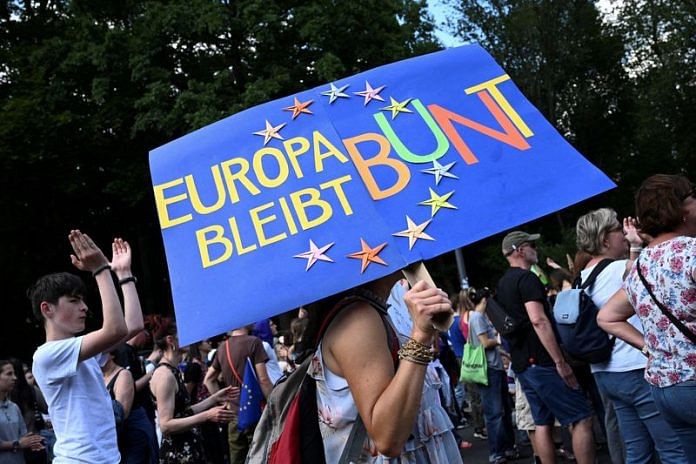FRANKFURT (Reuters) -Europe must foster greater political stability, cut red tape and reduce energy price volatility to reverse falling foreign direct investment, EY said after a survey of business leaders.
The more than 500 executives surveyed by the consulting firm ranked political instability, including upcoming elections, populism and polarisation as the second-biggest risk for Europe, trumped only by an increased regulatory burden.
Europe has struggled economically for years on surging prices and the fallout from Russia’s war in Ukraine, fuelling populist sentiment that has lifted the far right in European Parliamentary elections and prompted French President Emmanuel Macron to call a snap national election.
Polls show the eurosceptic, anti-immigration National Rally (RN) ahead before the two-round French vote ending July 7, casting a pall over the economic direction of a country that last year topped EY’s FDI rankings in Europe.
“There are certain investments that may be at stake,” Marc Lhermitte, a partner at EY Consulting, told Reuters.
“International investors are looking at (the election) very carefully. A lot of them are starting to raise their voice, publicly or in back channels,” he said, warning it could be months before it was clear what policy path France was treading.
After Britain’s departure from the European Union and with Germany’s ruling coalition constantly at odds with each other, the French election adds to the big challenges facing Europe.
It has rattled financial markets in recent days, pushing up French borrowing costs on fears that a populist government would strain France’s already limited financial resources and hold up broader efforts to make the eurozone economy more dynamic.
Stagnant growth, big swings in energy costs and political uncertainty have all damaged the bloc’s competitiveness, particularly when compared to a booming U.S., leaving the world’s two biggest economic blocs on a diverging course.
Lhermitte said last year saw 15% fewer investments by U.S. companies in Europe, a sign the incentives in President Joe Biden’s Inflation Reduction Act (IRA) were persuading many American businesses to invest domestically.
“As geopolitical and global trade tensions intensify, European policymakers need to be equipped to respond rapidly and decisively,” EY said in its commentary on the survey.
“Individual Member States must be aligned on key areas, including which industries need to be protected and where the threats lie.”
Energy price volatility could be reduced by investing in better connected infrastructure and fostering a green transition given that Europe was overly reliant on Russia for decades.
But bureaucracy is the biggest threat, the executives said.
“European policymakers can alleviate these concerns by harmonizing regulation, reconsidering the pace of introducing new regulation and repealing outdated laws whenever possible,” EY said.
(Reporting by Balazs Koranyi and Mark John; Editing by Sharon Singleton and Alexander Smith)
Disclaimer: This report is auto generated from the Reuters news service. ThePrint holds no responsibilty for its content.



